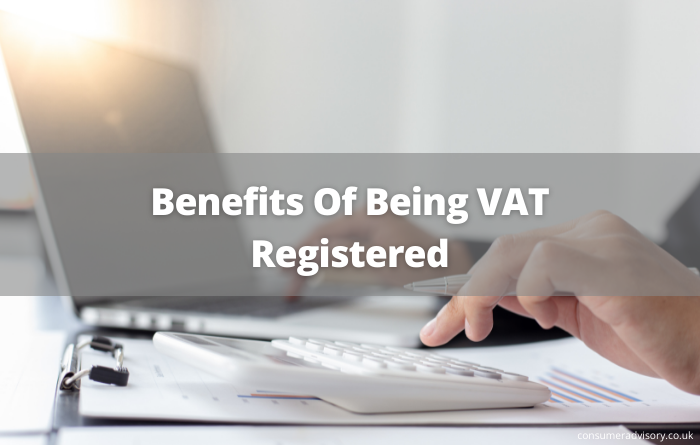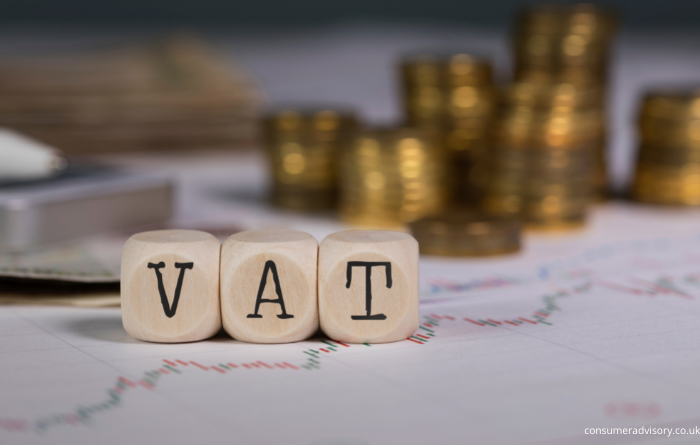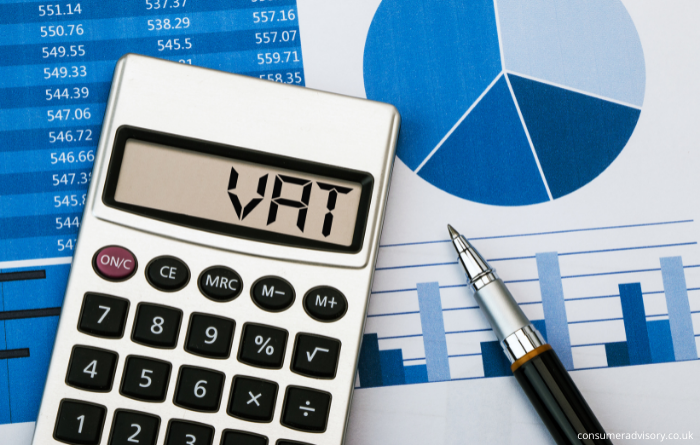
When it comes to VAT, the big question is whether or not to register. If your business turnover is below £85,000 per year, there is no obligation to register for VAT. However, there are some benefits of being VAT registered, which leads many businesses to register for VAT voluntarily.
The main benefits of being VAT registered are:
- Improved company image
- Claim back VAT on business purchases
- Backdated VAT reclaims before registration
- Prepare for future growth
- Get a VAT registration number
In this article, we’ll explore the advantages of VAT registration in more detail, helping you to make the decision of whether VAT registration is right for your business.
What Are The Advantages Of Registering For VAT?
VAT might not sound like a positive thing, but there are many benefits of being VAT registered in the UK. For some businesses, these outweigh the disadvantages, making being VAT registered a tempting option.
Here are the five key advantages of being a VAT registered business in the UK.
#1 Improve The Image Of Your Business
When it comes to promoting your business, image is everything. Many customers, especially in the B2B space, prefer to work with larger and more established companies. This is because they view them as more reliable and trustworthy.
Registering for VAT can help to make your business appear bigger, as your customers may assume that you are turning over more than £85,000 per year. This can help you to gain the trust of your potential customers and ultimately win their business.
#2 Improved Cash Flow
If your business is growing and you are starting to experience a shortage of cash, one way in which you can improve your cash flow is by registering for VAT voluntarily. While, as we have already mentioned, there is no obligation to register for VAT, many businesses find it beneficial to do so.
If you are VAT registered, you can claim back the VAT that you pay on business purchases such as office supplies and equipment. This means that if your business spends £5,000 per month on office supplies and other general expenses, this should be free of any VAT charges. As a result, by claiming back the VAT you pay on these business purchases, you can increase your cash flow and improve the financial health of your business.
#3 Backdate VAT Reclaims On Purchases Before Registration
If you decide to register for VAT, you will need to file a first quarterly return within 30 days of registering. Prior to this first return, you can backdate your claim for refunds on qualifying purchases. For example, if your business is registered for VAT from April 5th and makes a purchase of £2,000 on March 8th, you can still claim for this purchase when filing your first return. This means that if your business is registered from April 5th, you could reclaim the VAT on this £2,000 purchase in March and would receive a refund of £400.
#4 Prepare For Future Growth
If your business turnover is expected to grow beyond the VAT threshold of £85,000 in the next few years, it may be beneficial to register voluntarily and prepare for future growth.
This saves the last minute panic when you realise that your turnover has exceeded the £85,000 threshold, as you already know what you’re doing when it comes to VAT.
#5 Get A VAT Registration Number
Gaining a VAT registration number for your business might not seem so exciting. However, you may find that your business benefits vastly from having VAT registration number displayed on its website, stationary and documents.
In fact, many businesses find that there is increased credibility in their business when customers can see their VAT registration number.

Disadvantages Of Registering For VAT
Whilst there are many benefits of being VAT registered, there are also some disadvantages that you should be aware of. These include additional bookkeeping requirements, as well as having to abide by the VAT rules and regulations.
Here are some of the disadvantages of being VAT registered.
#1 Additional Bookkeeping Requirements
As a business owner, you may already have a lot of tasks to take care of. In addition to this, when your business is VAT registered you will have additional bookkeeping requirements.
You need to keep track of your taxable supplies and any purchases that are not taxed in order to be able to file your VAT returns. If your business uses accounting software, this can help to make the bookkeeping process much easier and less time consuming.
#2 Additional Invoicing Requirements
In addition to keeping track of your taxable supplies, you will also need to prepare additional invoices for each customer that you have successfully registered for VAT. This means that if you have a number of customers, you may need to create a separate invoice for each customer.
#3 You Are Liable To Additional Compliance
If your business is registered for VAT, this also means that it has additional compliance requirements.
This essentially means that you will be obliged to abide by the VAT rules and regulations. These include filing VAT returns, keeping records and abiding by the VAT rules.
In order to avoid these additional compliance requirements from being a burden on your business, you should ensure that your accounting software is updated regularly and kept up to date with changes in VAT rules and regulations.
#4 Increased Costs For Customers Who Are Not VAT Registered
Whilst VAT registered businesses can claim back VAT paid on business purchases, customers who are not registered for VAT themselves will see this additional charge as an extra cost in purchasing goods or services from your business.
For example, a customer who is not VAT registered might have to pay an additional 20 percent of the purchase price in VAT. This could potentially put off potential customers who are not registered for VAT. This is particularly applicable to businesses trading in the B2C space.
Who Needs To Register For VAT?
In the UK, businesses that have a turnover that exceeds the VAT registration threshold will need to register to pay VAT. This threshold is currently set at £85,000. This means that any business with a turnover of more than £85,000 will need to be VAT registered by law.
It’s important to note that turnover is the money that comes into the business, rather than profit. This means that you should not deduct any expenses from your business income when calculating your turnover.
However, you can also choose to register voluntarily for VAT, even if your business turnover falls below the £85,000 threshold. You might want to register voluntarily if you would like to claim back VAT on business purchases. The criteria for being able to claim back VAT are the same whether your business is under the turnover threshold or not.

How To Register For VAT
In the UK, you can register for VAT online through the HMRC website. You will need to be able to pay any applicable fees and charges associated with registering for VAT, as well as complete an online application form.
You also have the option of applying for a free trial period – this means you can try out being VAT registered before having to make any long-term commitment.
Is Being VAT Registered A Good Thing?
The main benefit of being VAT registered is that you can claim back VAT on any business expenses. In addition to this, you may find that prospective clients find your business more trustworthy.
Whilst being VAT registered isn’t right for every business, it’s important that you weigh up the pros and cons of registration to make the right decision for your business.
Is VAT Profit Or Turnover?
The VAT registration threshold in the UK is currently set at £85,000. This relates to your business turnover, not your business profit. So, as soon as you bring in £85,000 of income within a 12 month period, irrespective of any business expenses, you will need to register for VAT.
How Does Being VAT Registered Work?
Being VAT registered involves charging and collecting VAT on all sales that you make.
In the UK, there are different rates of VAT – standard rate (currently 20%), reduced rate (currently 5%) and zero-rate (0%). As a business registered for VAT, you need to ensure that you charge your customers the correct rate of VAT for their purchases. You’ll then pass this VAT onto HMRC.
As a VAT registered business, you will also be able to claim back VAT on any business expenses that you purchase. For example, as your business purchases electricity and pays VAT on it, you will be able to claim back the VAT from HMRC.

Should I Be VAT Registered?
Whether or not you should register for VAT will depend on the individual circumstances of your business.
If your business turnover exceeds £85,000 in a 12 month period, you legally need to register for VAT. This means as soon as your business income reaches the critical £85,000 mark, you need to ensure that you are registered to pay VAT.
If your business turnover is less than £85,000, you have the option to register for VAT voluntarily. There are both pros and cons of doing so, so you’ll need to carefully weigh up the advantages and disadvantages of becoming VAT registered before making your decision.
If you aren’t sure whether you should register for VAT, it’s best to consult a qualified accountant. They will be able to explore what is best for your business, and whether or not you could be better off if you register for VAT.
What Does Being VAT Registered Mean?
Being VAT registered means that your business is responsible for paying and collecting VAT on all of its sales. You will also be able to claim back VAT on any business expenses.
Whilst HMRC calculates your VAT registration threshold at £85,000, you can register for VAT voluntarily if your turnover is less than this amount. Being VAT registered is a legal requirement if your turnover exceeds £85,000 in a 12 month period.
In Summary
There are both advantages and disadvantages of being VAT registered in the UK. Before deciding which option is best for your business, it’s a good idea to talk through your options with a qualified accountant, as they will be able to advise you based on your individual circumstances.
In this article, we have explained the benefits of being VAT registered, as well as answering some of the most commonly asked questions about VAT registration.
